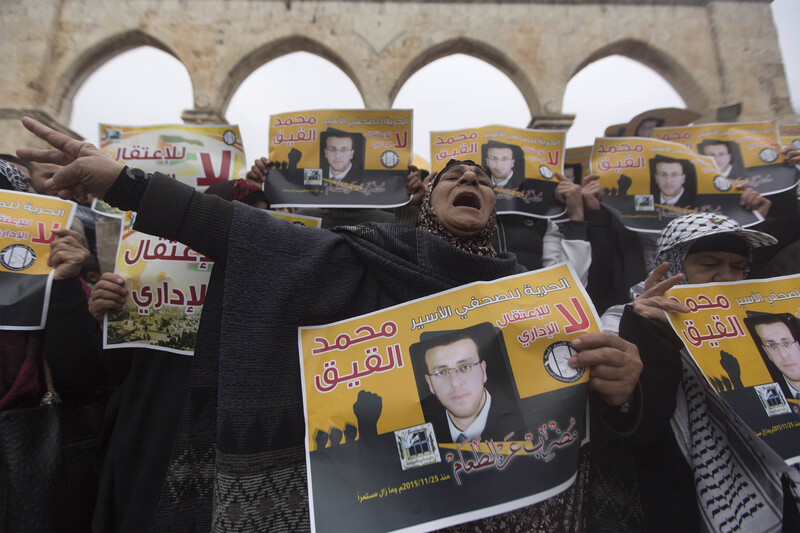Rights and Accountability 2 February 2016

Palestinians rally in solidarity for detained journalist Muhammad al-Qiq, who has been on hunger strike for more than two months, at Jerusalem al-Aqsa mosque, 29 January
ActiveStillsMuhammad al-Qiq can no longer speak and only communicates through signs.
This is according to a report issued by HaEmek hospital, in the city of Afula in the north of present-day Israel, where the hunger-striking Palestinian journalist is being detained.
But the hospital said that al-Qiq, who has refused all food since 25 November, is still consciously refusing any medical treatment, the Ma’an News Agency reported.
The hospital’s assessment was issued on the instructions of Israel’s high court, which last week rejected a petition to order the release of al-Qiq, whose condition is deteriorating rapidly.
Over the weekend, the 33-year-old father of two handwrote his will.
Al-Qiq is protesting his administrative detention by the Israeli occupation authorities.
After weeks of interrogation by Israeli soldiers, using means prisoner rights group Addameer describes as torture, al-Qiq was ordered to remain under administrative detention for six months.
Administrative detention is the Israeli practice of imprisoning people without trial or charge on the basis of secret evidence.
On 27 January, Israel’s high court ruled that the secret evidence against al-Qiq justified his detention.
No due process
In what B’Tselem describes as an unusual step, presiding judge Elyakim Rubinstein detailed Israeli military prosecutors’ suspicions against al-Qiq: “Involvement in recent military activity, in the operations of Kutla Islamiya [the Hamas student movement] in Birzeit University, and military contact with operatives in the Gaza Strip.”
“The entire process is not open: administrative detainees are not informed of the reason for their detention or the specific allegations against them,” the Israeli human rights group added.
The court ruling was in response to a petition filed by al-Qiq’s lawyer Jawad Boulos, which challenged the justification for al-Qiq’s detention and the supposed danger he poses, in light of his two-month hunger strike.
The court did not rule on how dangerous al-Qiq is, instead requesting the hospital deliver daily reports on his health.
The Israeli military prosecutor has reportedly insisted that al-Qiq remain detained so long as he is conscious, invoking the high court’s precedent in the case of Muhammad Allan, whose administrative detention order was suspended only when he lost consciousness and showed signs of brain damage.
On the day of the high court’s ruling, after weeks of waiting, Physicians for Human Rights-Israel was finally granted permission to send an independent physician to examine al-Qiq.
But according to B’Tselem, the hospital had still not allowed it more than a week later.
Al-Qiq has been subjected to forced medical treatment and pressure to end the hunger strike that Amnesty International has said is tantamount to torture.
“On the frontline”
Al-Qiq is a journalist with the Saudi news agency Al-Majd.
Human rights groups and Palestinian journalists have said that al-Qiq’s detention is related to his press work, and have called on Israel to charge al-Qiq with a crime or release him.
Over the weekend, al-Qiq released a statement from his hospital bed highlighting Israel’s persecution of Palestinian journalists.
“Palestinian journalists have always been on the frontline,” al-Qiq wrote.
“Palestinian journalists including myself are paying the toll of a racist Israeli policy,” al-Qiq added, referring to the “journalists who are shot and detained” all over the occupied West Bank and Gaza Strip.
The Palestinian Centre for Development and Media Freedoms (MADA) documented that in October alone Israeli forces committed more than 100 violations against journalists in the occupied West Bank, including East Jerusalem, and the Gaza Strip.
Last Wednesday, the European Union office in Jerusalem released a statement expressing its concern for al-Qiq’s health and reiterating its “longstanding” concerns about Israel’s extensive use of administrative detention, without formal charge.
However, such EU statements are never followed up with effective pressure on Israel to end this practice.
There are currently 660 Palestinians being held under administrative detention, according to Addameer, the highest number since November 2009.





